#basquephobia
Text
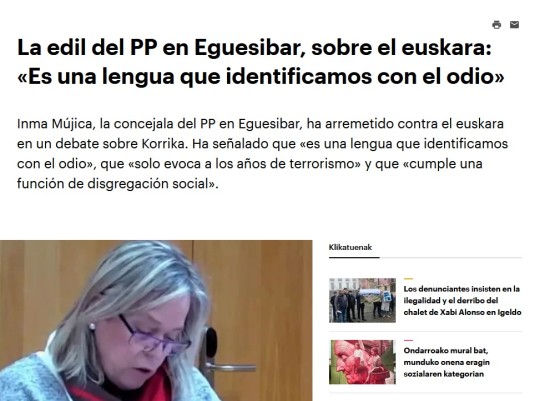
The Eguesibar council member (from PP) on Basque language: "It's a language we identify with hatred".
Inma Mújica, the PP council member in Eguesibar [Nafarroa], has charged at Euskara during a debate about Korrika. She has pointed out "it's a language we identify with hatred", that "only recalls the years of terrorism" and that "it fulfills a function of social disintegration".
[x]

The criminalization of our language is neverending.
#euskal herria#basque country#pays basque#pais vasco#euskadi#euskera#euskara#basque#language#basquephobia#politics#spain#news#oh well
92 notes
·
View notes
Text
This video is clearly not meant for Basque people, but for Spaniardas that don't know Euskara. It's just an example of how Spanish fascists spread Basquephobia.
The members of Bildu celebrated their elections results with the expression "Jo ta ke". But do you know what it really means? Jotakes are grenades designed and developed by terrorist band ETA in the years 1987-88. They were used in attacks like the one against the headquarter houses of Zarautz on Aug 7th 1987. They were also used in the attack against the headquarter houses of Mungia on March 23rd 1991. In fact, ETA former leader Txapote used this same expression during a trial at the National Audience. This expression was popularized by ETA-supporting band Su Ta Gar and that's why now it's used in different contexts meaning "hit it hard until victory". What do you think about Bildu now using this saying?
[x]
Jo ta ke means, literally, hit and smoke. It's believed it comes from what was said at the iron factories: hit (the iron) and then burn, hit (the iron) and the burn, all the time until the work was done. With time, it became a synonym of tirelessly. So the super usual saying in political or sport contexts Jo ta ke irabazi arte! just means Tirelessly or non-stop until victory.
It existed long before Su Ta Gar's song ffs.
The grenades were called jotakes because of this same meaning: we keep going towards victory non-stop, as the weapons were means for ETA to achieve their goals.
Jo ta ke - and Basque language in general - isn't something that was born for ETA or ETA-supporting environments as these fascists like to make people believe, once and again. They're indeed jo ta ke until more and more people hate Basques. Luckily, many know better but still this is plain misinformation and blatant Basquephobia.
They're just bitter EH Bildu had an incredible result at the Basque elections and because ~70% of Basque votes were for Basque nationalist parties.
#euskal herria#basque country#pays basque#pais vasco#euskadi#spain#fatxis gonna fatxing#politics#video#euskera#euskara#basque#languages#spanish#basquephobia
57 notes
·
View notes
Text

They've turned Basque society into Basque-speakers, erasing every trace of their roots as well as their western heritage, without any objection.
Official X account of the government of the Autonomous Community of Madrid.
1 - Why tf is the government of Madrid even commenting on Basque society?
2 - Verb "euscaldunizar" [of course they went for the Spanish orthography!] is obviously a Basque loanword. It comes from euskaldun which means Basque speaker (literally, the one who has the Basque language), and here it's used as something pejorative. Because Spanish nationalism = rampant Basquephobia.
3 - "They" - referring to PNV - made Basque people Basque speakers. There weren't Basque speakers before PNV in her head. Wow.
4 - Those erased roots... are they here in this room with us?
5 - And WTF is "western heritage", bitch, the West is considered to be a group of many countries and nations, each with their own heritage, wtf are you even talking about!!
#euskal herria#basque country#pays basque#pais vasco#euskadi#spain#politics#spanish nationalism#ughhhhhh#basquephobia#once again this shit#i can't
40 notes
·
View notes
Text
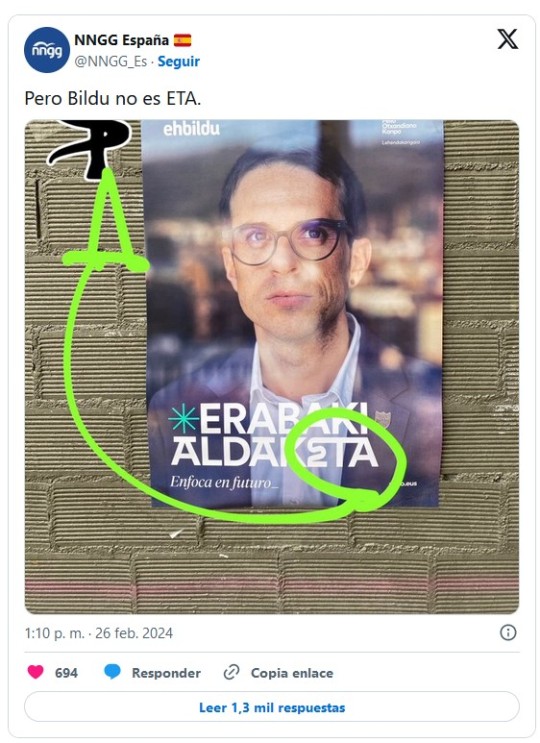
And PP insists on their Basquephobia, once and again.
Look at their tweet: a poster of EH Bildu candidate for Basque presidency with the motto erabaki aldaketa, meaning choose the change.
PP fellas are so fucking dumb and malicious that they circle out the ending of aldaketa and tweet "But Bildu isn't ETA", like if EH Bildu members were leaving subliminal messages on their posters.
We Basque people are known for being terrorists and terrorism supporters - or so PP people say - and we say ETA when we want to say and, we take azterkETAk (exams), we make eroskETAk (purchases), we even eat krokETAk, and are always having gogoETAk (reflections) on the neverending Basquephobia from the Spanish nationalists.
#euskal herria#basque country#pays basque#pais vasco#euskadi#spain#wtf#euskera#euskara#basque#language#basquephobia#incredible#truly#politics#pp
37 notes
·
View notes
Text
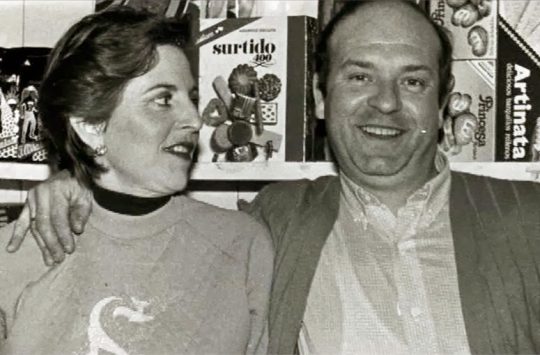
Ángel Berrueta, the only fatality not reknown as an official victim of the 11M attacks.
His widow recalls:
Around 13.15 entered María Pilar Rubio, telling my husband to hang a poster on the bakery shop window saying "ETA ez" [No to ETA]. Then my husband told her no, that he wasn't going to hang anything regarding politics because he'd never done so, and that if she wanted to hang it she could hang it in her own house. According to witnesses she went up to her apartment and two seconds later her husband and son came down with her. In the lobby she met some neighbors and told them directly, no questions aked: "we're gonna kill that son of a bitch". They entered the bakery, my husband was alone, and the Spanish national police officer's son fatally blew him twice with a machete. My husband tried to protect himself going to the back room and there the police officer finished him off with 4 shots from his standard issue pistol. I had just arrived home from the bakery and I recieved the call telling me to go back because Ángel had been shot, and I went back running. The police officers that were there didn't let me in but I eventually could and found him, lying on the floor, almost without life, paramedics were doing all they could to revive him.
Goian bego.
[x]
#euskal herria#basque country#pays basque#pais vasco#euskadi#11m#angel berrueta#this crime makes my blood boil#ugh#basquephobia#justice wasn't served#not even close#death tw#murder tw
31 notes
·
View notes
Text
The High Court of Nafarroa confirms the city hall of Atarrabia has to erase the coat of arms fo EH from the town fronton.
Atarrabia is a town near the Navarrese capital of just around 10,000 inhabitants. Also, friendly reminder that pilota is a Basque sport played in the fronton, wehre the coat of arms is. This fronton can host 500 viewers. JUST 500 PEOPLE, keep that in mind.
The matter has its origin in the repainting of the Zazpiak Bat coat of arms, which includes the seven Basque provinces accompanied by the term 'Euskal Herria':
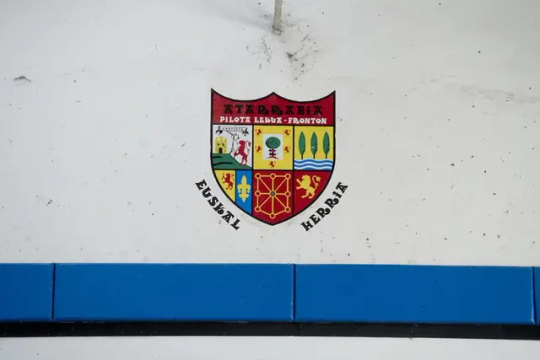
The sentence reads: "It is not denied that one of the possibilities of using the term 'Euskal Herria' - or the coat of arms that represents said concept - can be neutral and non-partisan, but nor can we ignore the notorious political activity that seeks the integration of Nafarroa into the Basque Autonomous Community, nor the legitimate aspiration of forming a legal-political reality that does not exist today and of which these seven territories are part.
This partisan aspect - or its possibility or appearance thereof —also exists. (...) The visual message is loaded with meanings, and a non-negligible part of them is far from being limited to an ornamental purpose or a designation of merely historical or cultural realities. Furthermore, as it is a coat of arms that integrates territories, the visual effect of convincing or proselytizing on the viewer is also worth taking into account."
The magistrates conclude that "the place where the symbol displays its effects belongs to all citizens, so the duty of neutrality requires, therefore, the suppression of the coat of arms."
So they're forced to erase this symbol just because the possibility of a partisan aspect may or may not exist on it, and also because judges consider its symbolism SO powerful it could rot the viewers brains and convince them with independentist ideas, 500 people - if there's a sold out - at a time. Because, you know, when you go to a fronton you spend your time looking at the coat of arms instead of the game.
There's a possibility, too, the coat of arms may not be partisan and related to a traditional sport played all over those evil seven provinces, but that won't be taken into account, seemingly.
This is what we have to deal with, even in the smallest towns, in the tiniest buildings.
[x]
#euskal herria#basque country#pays basque#pais vasco#euskadi#nafarroa#atarrabia#news#politics#basquephobia#once and again#suppression of our symbols
30 notes
·
View notes
Link
The judge has finally prevailed over the will of Bergoi and Alazne, a couple from Araba who wanted her newborn baby to be called Hazia. The magistrate has however decided that the baby girl will be called Zia, a name of Latin origin that means the same as Hazia in Basque, that is, seed.**
The family's requests have been useless before the judge who urged them to choose another name because if not "she herself would choose one." Finally, she did. Bergoi and Alazne do not give in and will appeal this decision. They will do it before the General Directorate of Legal Security and Public Faith, in Madrid, to ensure that the girl - who was born on October 22nd - is called Hazia. In that moment the parents delegated to the hospital the process of requesting her registration in the official registry. They did not imagine that two days later, they would be told that the name wasn’t accepted that because there was no other girl with that name and because hazia and its meaning was a noun****.
In Spain, there are freedom to name your baby, but laws protect them against a name that is diminishing or cruel for the baby. The family even contacted the Royal Academy of the Basque Language, Euskaltzaindia, if this was the case and Hazia has a diminishing meaning. The Academy did not see the problem of calling their daughter Hazia. Friendly reminder that there’s an accepted Basque name (Zigor) that means punishment, and in Spanish you can be called Dolores (pains).
**According to those sh*tty baby names sites on the Internet. Seed is semen in Latin and zia - just like Italian - means aunt.
**** Because it’s a noun our a*s. Just some Spanish female names that are nouns and accepted: Rosario, Camino, Juncal, Jara, Rosa, Alba, Nieves, Mar, etc.
So this judge has decided that supposedly Latin Zia is acceptable but Basque Hazia is not. The fact that we’re still dealing with this sh*t in 2022 blows our mind.
#euskadi#euskal herria#basque country#pais vasco#pays basque#google news#araba#gasteiz#baby names#basquephobia#spain#ugh
326 notes
·
View notes
Text
Silly reel on Insta: Text saying "Me moving to a country where Spanish is spoken so adaptation is easier. Me in Euskadi" + audio with a conversation in Basque and the poor dude nodding as if he understands.
First comment: Sorry, I don't speak ETA.
Why are some people like this?
#euskal herria#basque country#pays basque#pais vasco#euskadi#sigh#silly things but they're annoying af#basquephobia
16 notes
·
View notes
Text
And the plot thickens!!! [Previous post here]
The same judge refused to register a baby boy as Ilargi (moon) because she considered it a female name - she’s a Basque philologist now, it seems. She decided the baby would be called Jon and so she registered him. The family has appealed and is waiting for a resolution.
Friendly reminder that nouns and adjectives have no gender in Basque and it’s completely common and correct to use names like Haizea (wind), Ibar (valley), Sustrai (root) or Zeru (sky) for both boys and girls.
Why is this judge still working????
#euskadi#euskal herria#basque country#pais vasco#pays basque#news#baby names#basquephobia#ugh#send her elsewhere#please
172 notes
·
View notes
Text
History of legal Basquephobia
Iñigo Urrutia (1966, Jatabe-Maruri), together with Xabier Irujo, has analyzed the history of legal Basquephobia law by law and rule by rule. The result is the book Historia Jurídica de la Lengua Vasca (1789-2023). To Basque speakers on both sides of the border who are told that we are imposing Basque with every smallest step in favor of our language this work gives us a clear answer: the ones that have been imposed here, with great suffering and in violation of basic human rights, have been the French and the Spanish.

In the last 230 years, how many laws have been passed in the states of France and Spain against the Basque language and the Basque people?
- There are thousands of rules. We have searched the Boletin Oficial del Estado and the former Gaceta, as they can be consulted easily on the internet. Those of the French State we have taken from the Official Journals and previous works on the history of minority languages and the legal history of French.
Are laws against the Basque language or against Basque people?
- This is a very good question, difficult to answer. Basque has always been the target of political power, but behind this there is a historical attitude against the nature of Basques. During constitutional periods, dictatorships, etc., it has always been a constant to oppose our language.
(...) Basque-speaking children who did not know French would suffer terribly - as happened to those who did not know Spanish in the South. Many, to the point of deciding not to pass on Basque to their children.
- We suffered a terrible deculturalization as a people. But on a personal level, from the point of view of freedom and rights, the situation would be dire. Go to a place, completely foreign to you, unable to talk to your friends, suffer punishments for wrongly using the official language, suffer bans, be labeled a traitor against the revolution... "What are we doing here?", many Basques said. International human rights law absolutely prohibits forced assimilation, and this was the case. The violation of human rights extended a lot in our history, in the South until the Republic period, and again during Francoism. Therefore, this genocidal policy against Basque, created during the French Revolution, has lasted until today, for almost 250 years. Basque is now a minority language, but 200 years ago it was the main language in a large part of the territory, so imagine what kind of transformation process the state has caused. However, it must be said that the structuring of the Spanish state has been very slow, that of France has been much stronger and more violent.
At the beginning of the 20th century, we also suffered from xenophobic attitudes against Basques, Bretons, Catalans, etc., for example, the French Minister of Education, Jules Ferry, literally said "the higher races have the duty to civilize the lower races". Did you find many of them?
- Yes, power encouraged this supremacism. Ferry also passed a long-standing language law. He believed that the French were on a different level and wanted to spread this idea through education, a huge attack on many communities. The negative impact of this is very high.

During Francoism, persecution reached all levels. Basque names were banned from being registered in the registry, or the letters k, tx, and b were banned, forcing thousands of names, surnames, and toponyms to change from Basque spelling to Spanish. A century later, these are the laws that have left their mark.
- The attacks against the anthroponymy of the names were very great, because of the spelling and so on. To give a few examples, they also banned Basque on ships, ordered the eradication of Basque phrases and words on matchboxes or went so far as to remove Basque inscriptions from tombstones. And there is a case, from Gernika, where the owners did not erase the Basque inscriptions on the tombstones, the fascist authorities covered them with concrete. Many things were prohibited by the rules, but many other things were made subject to military power. And of course, any activity against public order could be anything, including speaking Basque. Therefore, anything could be done against the conversations in Basque. They were somehow protected by the law. Penalties and fines were also daily. Speaking Basque had no legal protection and could be considered an act against public order. It must be remembered that in many places society was Basque at that time. In Donostia, for example, the Civic Guard was established, it was an organization that aimed to eradicate Basque from the streets. There were usually groups of four and the agents walked around without uniform. They were scattered through the streets, and if someone heard somebody speaking in Basque they told them to speak in Spanish. After that, however, another couple of agents would come closer and if they heard that the citizens were continuing in Basque, they would fine them or beat them, as it is documented. They were strategies to instill fear, so that people would stop speaking Basque in the street.
And in general, what would you highlight from your book?
- That there has been an assimilation process against us, but that the passion, desire and strength of our people to persevere is striking. Despite the laws, decrees, punishments etc. against the Basque language, our people have survived and this gives us a strong character. It proves that we are a nation that wants to own its future.
You start it with Raphael Lemkin's definition of genocide in The Axis Rule, and towards the end you say that [Spanish and French states] wanted to inflict a cultural genocide on the Basques. That's a big word.
- Yes, genocide is a big word, but the book makes clear that the policies against the Basque language have lasted for centuries and have been carried out by all political ideologies. The behavior against our language is not limited to a certain period: in the last 200 years, during constitutional periods, dictatorships, transitions, times of war... the systematic and legal oppression against the Basque language has been deepened. Lemkin's definition of genocide is perfectly met. My partner Xabier is presenting this book at US universities and speaks openly about this genocide.
Source
#euskal herria#basque country#pays basque#pais vasco#euskadi#oppression#Basquephobia#Interview#News#Culture#History#minoritized languages#Hatred
45 notes
·
View notes
Text

This is a comment under some news about how in Euskadi salaries are up to 700€ higher than in other places, for example, Extremadura. It's hateful and depicts a distorted reality, but I'm sharing so you can see, because many people in Spain have these same ideas that right wing loves to mantain. It reads:
Extremadurans have it easy, I'm going to give you the guidelines to get rich at the expense of the rest of the Spaniards:
1. Invent a language and say that it has been spoken for 7000 years
2. Invent that you are an ancient nation from 5000 years ago (less than the language to make it exciting) with a few absurd dances and silly sports and typical clothing, for example a huge beret. I know it's ridiculous but trust... the flag, copy one of any other country and just change the colors, now say that it is original and not a copy.
3. Wait until there is a coup d'état by some asshole and start being annoying saying you are leaving Spain so that that dictator fills you with industry.
4. Create a terrorist group to tighten the screws even more. Remember that children are bonuses and that it is good if a terrorist dies to become a martyr. Support the terrorists blindly and say that they are not terrorists but warriors of your homeland even if they kill children. Don't forget to honor them...
5. Wait until the dictator dies, those who install democracy will do so in such a way that they always depend on your votes and thus be able to do what you want
6. Look in ancient texts from centuries ago to see if you have any special privileges in terms of old laws and thus you will not pay a single penny to the State but you will receive from Spain.
7. You will already be in a situation where all the country's benefits will go to you thanks to the dictator and having the politicians taken by the balls while you stand out from the rest by portraying some of the terrorists and those who support them as politicians...
You just got rich.
#euskal herria#basque country#pays basque#pais vasco#euskadi#spain#politics#oh how i wish this vision belonged to only two or three trolls on the internet#the world would be a better place#extremadura#comments#basquephobia#spanish
14 notes
·
View notes
Text
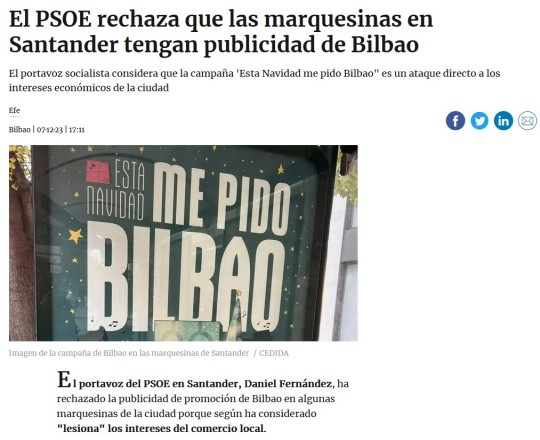
PSOE against bus stops in Santander displaying Bilbao ads.
The PSOE spokeperson Daniel Fernánedez, has rejected the promotion campaign of Bilbao (posters reading "For this Xmas I want Bilbao") in some bus stops in Santander because it's his understanding - and his party's, I presume - hurts the interests of local shop owners.[x]
The basquephobia of some people is just off the charts.
Bilbo is 100km away from Santander. So even though some citizens from that city come visit (and shopping) before Christmas, the large majority of them will likely skip a 200km trip and shop local. Internet hurts Cantabrian shop owners way way way more than the mere existance of the shops in Bilbo.
If people want to go outside Santander to shop, it isn't a crime? It's not as if people were being given free train/bus tickets and discounts to leave their city and shop in Bilbo, they're just posters ffs.
I'm sorry, but somebody in the Santander council or Cantabrian government greenlit this. I highly doubt that Mr. Aburto - mayor of Bilbo - has gone incognito one night and flooded the bus stops of Santander with posters promoting Bilbo.
I don't know, I guess their other neighbors - namely Asturies and Castile and Leon - aren't luring the good people of Santander into shopping there to drive local shops to bankruptcy, that's only something we Basques can do.
Ugh, really.
#euskal herria#basque country#pays basque#pais vasco#euskadi#cantabria#basquephobia#ridiculous#really#news#spain
19 notes
·
View notes
Note
It fascinates me that people hold the age of Basque language against Basque people. That post you shared of that troll hating "invent a new language and say it's 7,000 years old". Like, bruh. That the fact of a language being ancient af becomes also a weapon for criticism for some people just blows my mind!

14 notes
·
View notes
Text
Javier Ares, commenter of Eurosport, showed himself rather annoyed by Jorge Azanza - director of Basque cycling team Euskaltel-Euskadi - cheering up his athletes in Basque.
Ares said: Well, the experiment is okay but it should be improved: one must speak in Spanish too, or translate at the same time. Although, well, this could be a good course for learning Basque, if anybody has any interest in it.
If this wasn't enough, the race they're competing in is the Itzulia - The Basque Country Tour.
Would Mr. Ares say that the French director of a French team competing at the Tour de France should drop their linguistics experiments and speak to their men in Spanish?
Yeah. It wouldn't even cross his mind.
Nazka!!!
Source
#euskal herria#basque country#pays basque#pais vasco#euskadi#Itzulia#cycling#Euskera#Euskara#Basque#Spanish#basquephobia#Sports
41 notes
·
View notes
Photo
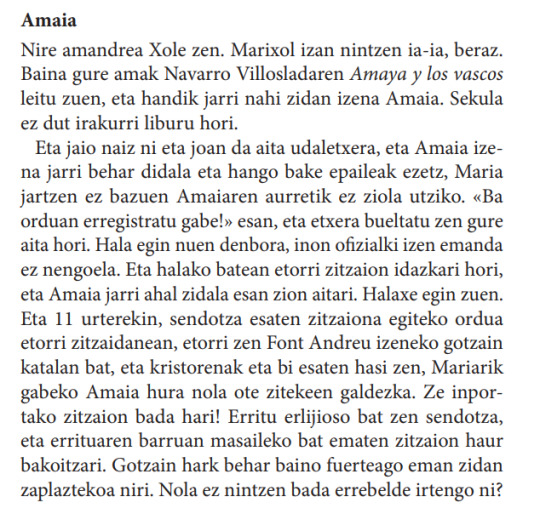
My grandma was called Xole. That’s why I was almost called Marixol. But mum read “Amaya y los vascos” by Navarro Villoslada, and since then she wanted to call me Amaia. I’ve never read that book.
And I was born, and dad went to the city council, and he said that I should be called Amaia, and the judge said no, that he wouldn’t consent to that name without Mary before it. “Well then, unregistered!” said dad, and went back home. That’s how time went by for me, having no official name anywhere. And one day my father contacted that writer, and he told dad that he could give me the name Amaia. And being 11 years old - when it came the time to be confirmed - here came a Catalan bishop called Font Andreu and started to go crazy, asking how could be possible that Amaia without Mary! Why would he care! Confirmation was a religious rite, and giving each kid a soft slap on the face was part of it. That bishop slapped me harder than necessary. How could I not become a rebel?
Personal story of Amaia Lasa, born in Getaria in 1948 (source).
Being denied to use our names is a veeeery old story, but this case is even worse because the name wasn’t created by that author, it’s a mountain and old fort in Burgos that sounded too Basque.
#euskadi#euskal herria#basque country#pais vasco#pays basque#basque names#oh well#history#culture#basquephobia#catholicism#euskera#euskara#basque#language
57 notes
·
View notes
Text
The future of the Basque Country depends on attracting talent and foreign labor. People who, born anywhere, come to contribute. Putting up language walls will make them go elsewhere.
Seen in this article.
Basquephobia at its finest.
Imagine that people don't go looking for a living to Germany because they speak German; or to Sweden because they speak Swedish; or to France, because they speak French. That being the case, let's all speak English and move around freely!!
Also, most of those people that come here for a better job LEARN Basque and have no problem with it and don't make a drama of it! We personally know Senegalese, Polish, Andalusian, Catalan and Moroccan people that are perfectly euskaldun. Most of the die-hard I-won't-learn-Basque-because-I-say-no" people are from Spain, or even from EH that are willing to make a political point, nothing else.
WTF is that article defending then??? To erradicate Basque, full stop.
Another day, another attack against our language.
#euskadi#euskal herria#basque country#pais vasco#pays basque#euskera#euskara#basque#language#basquephobia#ugh#languages#personal
40 notes
·
View notes